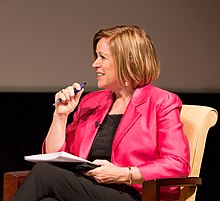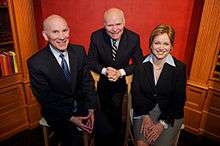Susan Swain
Susan Swain is an American journalist, author and the co-CEO of C-SPAN.[1]

Early years
Swain was born December 23, 1954 in Philadelphia, Pennsylvania. Swain was educated in public schools in the Philadelphia area. Swain studied at the University of Scranton where she graduated with B.A. in communications. In 1999, the school awarded her an honorary doctorate.
Professional Career

Swain started with C-SPAN in 1982. She began as a producer on a part-time basis when C-SPAN was just one channel. As time went on she graduated to other assignments, such as full-time producer, programmer, and moderator for Washington Journal, C-SPAN's morning call-in/interview program. Swain eventually was promoted to vice president of corporate communications, senior vice president, executive vice president. Swain became the Director of Discovery Communications, Inc. in December 7, 2016. [2] With retirement of Brian Lamb , she is now Co-President and CEO of C-SPAN. [3]
Bibliography
- First Ladies: Presidential Historians on the Lives of 45 Iconic American Women
- The Supreme Court: A C-SPAN Book, Featuring the Justices in their Own Words (C-Span Books)
- Abraham Lincoln: Great American Historians on Our Sixteenth President (C-Span Books)
- The Presidents: Noted Historians Rank America's Best--and Worst--Chief Executives (PublicAffairs)
References
External links
- Appearances on C-SPAN
- Susan Swain's oral history for The Cable Center's Hauser Oral History Collection, December 13, 2017